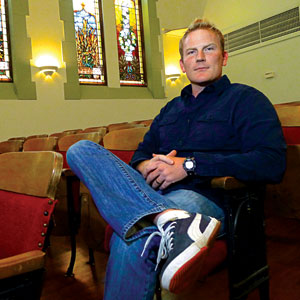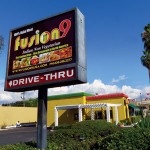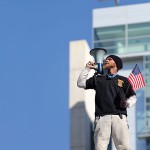A few months ago, with just $3,000 in his pockets, Justin Buzzard packed up his car and drove down the bay toward San Jose. Like so many young people, Buzzard came to Silicon Valley with big dreams.
Start something new. Find a following. Get funding. Change the world.
But Buzzard didn’t come here to found the next tech startup. He came to “plant,” or open, a church.
“It’s a region that’s impacting the rest of the world, and you don’t have another place like this on the planet,” says Buzzard, whose 2-month-old Garden City Church attracted 120 worshippers on a recent Sunday.
Buzzard shepherds just one of 20 socially conservative, nondenominational Christian churches slated to open around the Silicon Valley by 2015.
Many of these churches are targeting a particular demographic: under-30, ever-more-secular adults.
Garden City’s website references research from the Barna Group calling the San Francisco Bay Area the most un-churched region in America. And Forbes magazine recently named San Jose one of the most sinful cities in America.
“That was a good part of our motive to want to be here,” Buzzard says. “I don’t want to plant a church in Nashville, where Nashville has more churches than gas stations. I want to go where there is real need.”
Muscular and faux-hawked, Buzzard takes the stage at one of his services. As he opens his sermon on the parable of the minas, most of the crowd opens up their Bibles to follow along—except for the two men in one row who pull up the scriptures on their iPads. For half an hour, Buzzard engages the crowd with a relaxed, humorous, casual delivery, working in references to the NFL, D-Day, Francis Ford Coppola, Albert Einstein and fermented cod liver oil. He often gestures toward the crowd, flashing the cross tattooed on his right wrist.
Buzzard’s ambitious plan isn’t new nor is it often successful. He says between 50 and 80 percent of church plants fail. But the risk is one worth taking. Buzzard didn’t just target San Jose for its sin.
Garden City, which rents space from Westminster Presbyterian Church, draws college students from nearby San Jose State University and Santa Clara University. Most of his membership are in their mid-to-late 20s. With some followers working for tech giants like Google and Facebook, he hopes they use their faith and career connections to make a difference.
“If I can get these people to understand that the work they’re doing is impacting the rest of the world, that’s huge,” Buzzard says. “So I really think to plant a church in San Jose you’re not just going to impact San Jose and Silicon Valley, you can have a broader worldwide impact.”
But taking a strict interpretation on some of the more divisive passages of the Bible—such as those dealing with homosexuality—the Bay Area might be the last place Buzzard and other church planters can succeed.
The Gameplan
Garden City was one of the first Bay Area churches to join up with Vision 360, a worldwide collaboration between church and business leaders hoping to transform the world’s cities for God.
{pagebreak}
Former Sunnyvale pastor Dave Chae joined the organization in September. Having already planted six churches in 10 years, “Vision 360 came knocking,” Chae says. “They wanted somebody who understood church planting and multiplying.”
The goal: Plant three churches by the end of 2012, 20 by 2015 and 100 by 2020.
“When I first asked them about why the numbers are so big, it’s kind of interesting, these guys are fairly scientific about it,” Chae explains. “I think the idea is that they would be multiplying; churches that plant other churches.”
Vision 360 officially launches in the South Bay at Westgate Church this week, where more than 200 pastors and church planters will gather to talk about spiritually transforming the South Bay.
Chae says church planters who pass Vision 360’s assessment process can get up to $150,000 in funding over three years, along with help to find meeting space or even church bands.
That kind of support can really help out men—and the planters are all men—like British-born and self-described “serial church planter” Bill Jenkins, who recently opened Urban Life Church, which meets on the top floor of Loft Bar and Bistro on South Second Street. Urban Life is billed as “church in a bar” on signs dotting nearby sidewalks.
Jenkins has planted suburban churches in the past, but he’s been turned off by the “Christian country clubs” he’s seen out there.
“I think there’s more opportunities downtown to be effective in ministry,” Jenkins says between sips of an after-church pint. “We’re focusing on cities because we believe God is orchestrating the biggest migration of human beings in history.”
Kristal Serrano, a SJSU undergrad, says she showed up to Jenkins’ service after spotting the “church in a bar” sign while shopping downtown. Growing up attending a few nondenominational churches in Southern California, she says she enjoyed the relaxed, casual atmosphere at Urban Life.
“I thought it was kind of cool, kind of different, like really, really modern,” Serrano says.
Professor Jeffrey Danese, who teaches courses on religion in America at SJSU, says he sees fertile ground for churches that focus on younger adults. “From many of my own students, I hear often, a deficit in meaning, that students really miss and don’t have a basis upon which to make important decisions in their lives,” says Danese.
And while reaching out to the less fortunate may attract younger South Bay believers, Danese says conservative churches may focus on charity for other reasons.
“They see what’s happened in Europe, and they know exactly why secularism dominates in those countries. It’s because the welfare state takes care of people,” he explains “Their needs are filled by the state. I don’t think those ministers would acknowledge that consciously, but I’m sure they intuit that. I’m sure they feel the competition.”
Indeed, the website for Vision 360, a nationwide network for church planters that will hold its first South Bay conference next week, cites a survey of young evangelical and mainline Protestants, that found that 70 percent who attended church regularly in high school quit attending by age 23.
“On the current trajectory, America will shift from a post-Christian culture to a post-church culture, much like Europe,” reads Vision 360’s site.
That’s probably nowhere more apparent than in the Bay Area—a liberal enclave for issues like gay and women’s rights.
Garden City’s Statement of Faith says Adam and Eve established “the only normative pattern of sexual relations for men and women.” Translation: Marriage is only between a man and woman.
Buzzard acknowledges he’ll have to address those third-rail issues carefully.
“We want to do that in a way that engages our community, that’s winsome, that’s thoughtful, that’s sophisticated, that doesn’t just merely say, ‘Hey, this is what we believe, if you don’t believe this, well, screw you,’” says Buzzard.
“But we’re not going to have, like, ‘Gay Marriage Sunday’ or preach a sermon on that. That’s not really the plans for what we do,” he adds. “We’re not here to pick fights or pick battles.”

 Review: Fusion 9
Review: Fusion 9  One Man Against the 1 Percent
One Man Against the 1 Percent 

